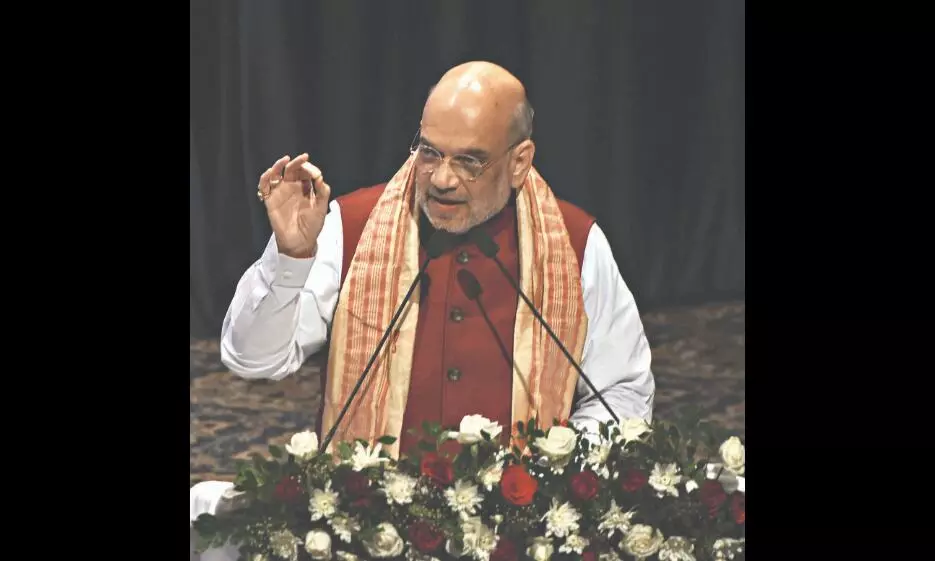Amit Shah appeals for peace in Manipur, assures justice for all

Guwahati: Union Home Minister Amit Shah on Thursday appealed to the people of Manipur to maintain peace and promised that justice will be ensured to all sections of the society.
Shah, while laying the foundation stone of the tenth campus of the National Forensic Sciences University (NFSU) to be set up in the Changsari area in Assam’s Kamrup district, said he will travel to Manipur to help resolve disputes.
“I will go to Manipur soon and stay there for three days but before that, both groups should remove mistrust and suspicion among themselves and ensure that peace is restored in the state,” he said.
“The Centre will ensure that justice is delivered to all those who suffered in the clashes in the state, but people must hold dialogue to ensure peace,” Shah said.
During the last six years, prior to the recent clashes, there was no blockade or bandhs in Manipur and ‘people must ensure the return of such a situation again”.
“Charcha ke saath hi shanti ho sakti hain (Peace can only be restored through dialogue),” he said.
Referring to the establishment of NFSU campus in Assam, the Union home minister said that this will guarantee 100 per cent employment opportunities for students taking up courses in the institute.
‘The Centre is planning to bring changes in the law to make it compulsory for forensic experts to visit the spot for crimes that attract more than six years of imprisonment,” he said.
“Prime Minister Narendra Modi has plans to bring about changes in the Indian Penal Code (IPC), Criminal Procedure Code (CrPC) and the Evidence Act in the spirit of the Constitution to increase the conviction rate which will help in the delivery of criminal justice,” he added.
Policing can be divided into three parts: law and order situation, crime investigation and ensuring justice by punishing the guilty, the home minister said.
‘This is not the age of using third-degree measures or force on the accused but there are scientific ways of collecting evidence through psychology, fingerprints and DNA profiling and we need experts for these,” he said.
The conviction rate in the country is low at 50 per cent and this is mainly due to lack of evidence or witnesses turning hostile which creates hurdles for the police in submitting chargesheets in the court, he added.
‘We have decided to strengthen the forensic infrastructure, upgrade and modernise the laboratories, set up regional forensic laboratories and also district-level mobile forensic laboratories,” Shah said.
This will require manpower and generate employment opportunities while research and development in this sector will be intensified and implemented at the grassroots level, he said.
Meanwhile, one person was killed and another injured in a fresh violence between suspected militants and a group of people in an area bordering Bishnupur and Churachandpur districts in strife-torn Manipur.
Toijam Chandramoni, 30, was shot dead during the violence on Wednesday, and Leichombam Abungnao, aged 22, was injured when suspected militants opened fire at the group of people, mostly comprising those who were displaced during the recent ethnic clashes in Churachandpur and took shelter in a relief camp at Moirang in Bishnupur, a police officer said.
There were reports that militants late Tuesday night torched the houses of some villagers at Toronglaobi in Bishnupur district, he said.
“The villagers and those living in the Moirang camp were angry over the burning of their houses. As these people came to know that militants could torch a school located in an area near Thamnapokpi in Bishnupur and Kanganthei in Churachandpur, they went to the locality.
“Once, they reached the spot, militants opened fire at them, leaving two persons injured. One of the two succumbed to his injuries when he was taken to a hospital,” the senior police officer said.
Following the violence, the authorities clamped curfew for 24 hours in the area and reduced the curfew relaxation hours in several other districts.
Clashes broke out in Manipur after a ‘Tribal Solidarity March’ was organised in the hill districts on May 3 to protest against the Meitei community’s demand for Scheduled Tribe (ST) status.
The violence in Manipur was preceded by tension over the eviction of Kuki villagers from reserve forest land, which had led to a series of smaller agitations.
Meiteis account for about 53 per cent of Manipur’s population and live mostly in the Imphal Valley. Tribals— Nagas and Kukis — constitute another 40 per cent of the population and reside in the hill districts.
The ethnic clashes claimed over 70 lives and some 10,000 army and paramilitary personnel had to be deployed to restore normalcy in the northeastern state.



